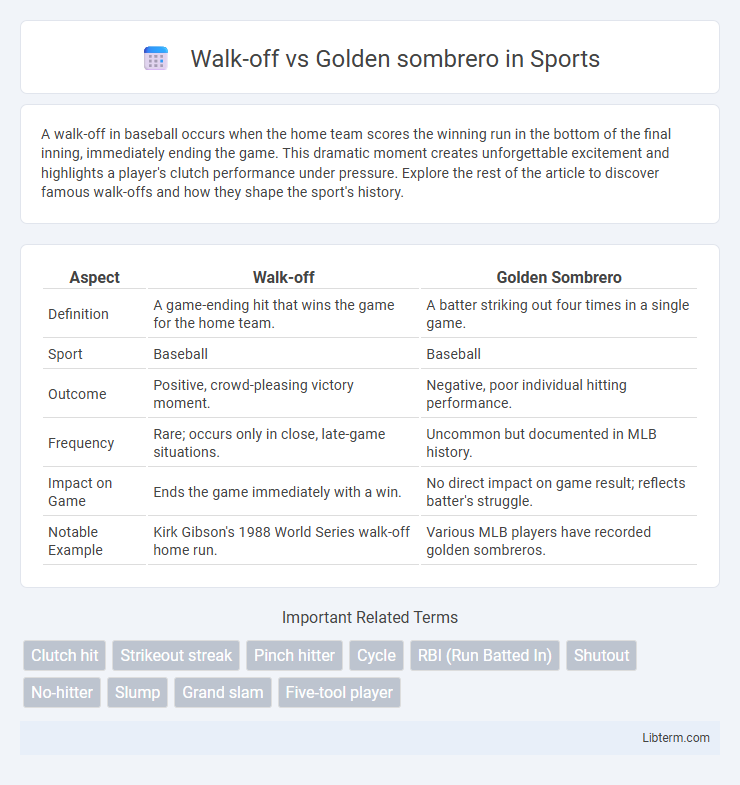A walk-off in baseball occurs when the home team scores the winning run in the bottom of the final inning, immediately ending the game. This dramatic moment creates unforgettable excitement and highlights a player's clutch performance under pressure. Explore the rest of the article to discover famous walk-offs and how they shape the sport's history.
Table of Comparison
| Aspect | Walk-off | Golden Sombrero |
|---|---|---|
| Definition | A game-ending hit that wins the game for the home team. | A batter striking out four times in a single game. |
| Sport | Baseball | Baseball |
| Outcome | Positive, crowd-pleasing victory moment. | Negative, poor individual hitting performance. |
| Frequency | Rare; occurs only in close, late-game situations. | Uncommon but documented in MLB history. |
| Impact on Game | Ends the game immediately with a win. | No direct impact on game result; reflects batter's struggle. |
| Notable Example | Kirk Gibson's 1988 World Series walk-off home run. | Various MLB players have recorded golden sombreros. |
Understanding Walk-Off Moments in Baseball
Walk-off moments in baseball occur when the home team scores the winning run in the bottom of the final inning, immediately ending the game and leading to an exhilarating victory celebration. These clutch moments, such as a walk-off home run or walk-off single, are pivotal in player performance metrics and fan engagement, highlighting the dramatic tension of late-game scenarios. Understanding the rarity and impact of walk-offs compared to negative outcomes like a golden sombrero, where a batter strikes out four times in a game, emphasizes the high stakes and emotional swings inherent in baseball.
The Golden Sombrero: Definition and Origins
The Golden Sombrero is a baseball term describing a player striking out four times in a single game, symbolizing a notably poor offensive performance. Originating in the early 20th century, the term evolved as an extension of the "hat trick," where three strikeouts earned a "hat," and four earned the exaggerated "golden" version. This expression highlights the rarity and severity of repeated strikeouts, contrasting sharply with a walk-off, which signifies a game-winning hit.
Key Differences Between Walk-Offs and Golden Sombreros
A walk-off occurs when the home team scores the winning run in the bottom of the final inning, instantly ending the game, while a golden sombrero refers to a batter striking out four times in a single game, highlighting poor offensive performance. Walk-offs are celebrated moments signaling victory, often generating excitement, whereas golden sombreros are negative marks on a player's stat line, reflecting struggles at the plate. The key difference lies in their context: walk-offs relate to game-ending dramatic plays, while golden sombreros indicate individual batting failures.
Psychological Impact on Players: Triumph vs. Disappointment
A walk-off hit ignites a surge of adrenaline and confidence in players, reinforcing their positive mindset and team cohesion. In contrast, a golden sombrero--striking out four times in a game--can severely damage a player's morale, leading to frustration and self-doubt. The emotional highs of victory clash sharply with the psychological burden of repeated failure, influencing future performance and mental resilience.
Famous MLB Walk-Offs in History
Famous MLB walk-offs like Kirk Gibson's 1988 World Series home run and David Ortiz's 2013 ALCS game-winning hits exemplify clutch moments that electrify fans, contrasting the infamous "Golden Sombrero" coined for players striking out four times in a game. Walk-offs signify dramatic victories, often cementing legendary status for players, while the Golden Sombrero represents a frustrating offensive night. Iconic walk-offs remain etched in baseball history for their high-stakes impact and emotional resonance, overshadowing the negative stigma of multiple strikeouts.
Notorious Golden Sombrero Performances
Notorious Golden Sombrero performances in baseball occur when a player strikes out four times in a single game, a rare and unfavorable feat highlighting offensive struggles. While walk-offs deliver dramatic victories with a final hit or run ending the game abruptly, golden sombreros emphasize the opposite by showcasing a player's offensive challenges. Historical examples include players like Kris Benson and Ron Kittle, whose golden sombrero games have become infamous for multiple strikeout displays.
How Teams React to Walk-Off Wins
Teams often experience a surge of momentum and morale following walk-off wins, boosting player confidence and team cohesion. Walk-off victories are celebrated with heightened energy in the clubhouse, leading to increased fan engagement and positive media coverage. This winning atmosphere can influence subsequent performances, creating a psychological edge that teams strive to maintain throughout the season.
Strategies to Avoid the Golden Sombrero
To avoid the dreaded Golden Sombrero, which occurs when a player strikes out four times in a single game, batters should focus on improving plate discipline by recognizing pitch types and zones more effectively. Emphasizing contact hitting through swing adjustments and timely decision-making reduces strikeout chances, while mental preparation and video analysis of pitchers' tendencies enhance situational awareness. Coaches often implement targeted drills to build confidence and consistency, significantly decreasing the risk of multiple strikeouts during critical at-bats.
Media Coverage: Walk-Off Heroes vs. Golden Sombrero Headlines
Walk-off heroes generate widespread media coverage highlighting clutch performances and game-winning moments, often dominating sports headlines with phrases like "Walk-off hero saves the game." Golden sombrero occurrences attract negative media attention, emphasizing player struggles and errors, with headlines frequently focusing on "player's rough night" or "spectacular failure at the plate." The stark contrast in media narratives influences public perception, celebrating walk-off achievements while scrutinizing golden sombrero performances.
The Role Both Play in Baseball Culture
Walk-offs and golden sombreros both encapsulate extreme moments in baseball, symbolizing triumph and failure respectively. A walk-off, achieved when the home team scores the winning run in the final inning, ignites fan celebration and cements a player's legendary status in baseball lore. Conversely, a golden sombrero, marked by four strikeouts in a single game, highlights a player's struggle and is often referenced humorously within baseball culture to underscore the sport's unpredictable nature.
Walk-off Infographic

 libterm.com
libterm.com